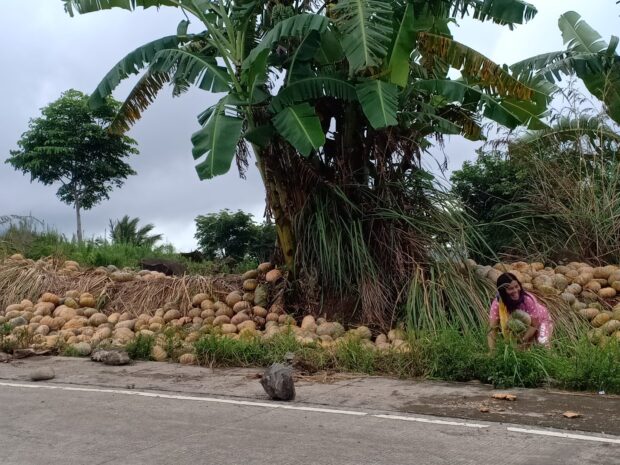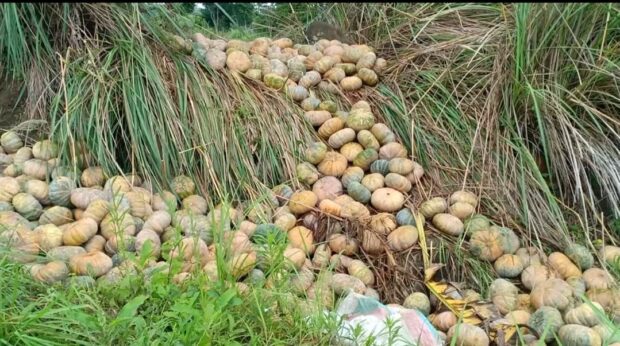In Cotabato town, the squash are left to rot by the roadside

ABANDONED. A glut in supply forces farmers to give their squash for free or leave them to rot along the roadside of Alamada town, Cotabato province. PHOTOS BY KIMYA ALVARES
ALAMADA, COTABATO — A supply glut has pushed the prices of squash in this town plummeting as low as P2 a kilo, forcing beleaguered farmers to either give them away or leave them along the roadside to rot.
In an upland village of Campo Dyes, mounds of squash (genus Cucurbita) were seen along the roadside to rot as farmers gave up hope of selling them at the right price, said Kimay Alvarez, who took photos of the abandoned squash and posted these on her Facebook page.
Edmundo Guleng, Alamada town agriculture officer, admitted that there had been a glut in the supply of squash recently after farmers, encouraged by the high buying price in the previous harvest, had planted squash in large volumes, resulting in an oversupply.
Guleng said that buying price of squash during the planting season early this year had gone up to as high as P24 per kilo.
Traders from Davao City, Cagayan de Oro City and even Cebu went to buy squash in Alamada.
Article continues after this advertisement“That tempted farmers to shift to planting squash, which eventually resulted in oversupply,” Guleng said.
Article continues after this advertisementNow, that the price of squash has plunged to a measly P2 a kilo, farmers who opt to transport their goods to markets for better buying prices would have to shoulder the added cost of hauling them to the main highway and paying the 10-wheeler trucks to bring them to such markets. These added costs discourage most farmers, who opt instead to either give them away or leave them rotting by the roadside.
“(We’re) losing,” said Iranun farmer Mitra Butig when former Agriculture Secretary Manny Piñol visited his farm in Campo 11, Rangayen of this town.
“I can’t even recover the P10,000 I spent buying my seeds,” he added. Butig opted to have the unharvested squash in the field be plowed by tractors.
“The law of economics applies here,” Guleng said.
Noodles
He said the local market could no longer absorb the volume of squash in the locality that his office eyed tapping the extra supply to produce noodles.
“We are still coordinating with other agencies that have the expertise and equipment,” Guleng said.
He also explained that farmers incurred these kinds of losses because of the oversupply brought about by unplanned farming.
He urged farmers not to be easily swayed by the bandwagon effect when choosing what crops to plant because their produce would always be subjected to the law of supply and demand when these reach the market.
Guleng also urged farmers to choose crops that have a longer lifespan and would not easily rot.

Oversupply forced farmers to give their squash for free or leave them to rot along the roadside of Alamada town, Cotabato province.
RELATED STORIES:
In South Cotabato, farm animals feed on vegetable oversupply
DA sees higher vegetable prices | Inquirer Business